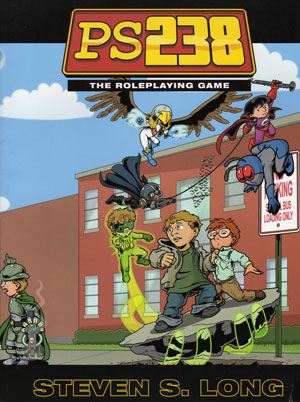Roleplaying for Metaprodigies
PS238: The Roleplaying Game
Here’s something I don’t get to do too often — reviewing a pen-and-paper roleplaying game. If you’re familiar with Aaron Williams’s “PS238” comic book, this should be fairly clear — PS238 is a school for kids with superpowers. They get training in how to use their powers and how to maintain a secret identity. The entire school is secret, located three miles underground beneath a normal elementary school, and the super-powered kids have to attend both schools. It’s a very funny comic, and I recommend it without hesitation.
So Hero Games put out a PS238 game, written by Steven S. Long, and made it compatible with “Champions,” the best-known and most popular superhero RPG. In addition to a complete set of the HERO System rules, the book also includes a complete description of the school, character stats for the faculty members, students, villains, and other important characters, and some general gamemastering advice.
I do have a few problems with the book. First, I’m not a big fan of the “Champions” system. I know, lots of people play it and love it, but I just can’t get into it. Back when there was a such thing as GURPS Third Edition, I liked their treatment of superheroes, and nowadays, I like to pick up “Mutants and Masterminds,” which really does seem to be the best superhero game I’ve ever seen. Still, obviously, my dislike of “Champions” is a personal preference only.
A bit more substantial a problem is the book’s typos, which range from “barely noticible” to “fairly wacky and embarrassing.” One thing that jumped out at me while I was reading the book was that they stuck Julie Finster with some of Captain Clarinet’s disadvantages — specifically, they said she had the same vulnerability to the Kryptonitesque mineral that CC did — of course, Captain Clarinet is an alien, and Julie is a human, so there was clearly a problem with copy-and-pasting stats from one character to another.
I was also unhappy with the quality of the gamemastering and player tips. Specifically, there’s no advice for either players or GMs on how they should roleplay children. It’s not that obvious, of course. Sure, we were all kids once upon a time, but slipping from an adult’s mindset into a child’s isn’t as easy as it sounds. Williams does a good job of it in the comic book, but there needs to be some advice on this subject in the book.
And this may seem overly nitpicky, but the cover of this book just plain honks me off. Look at it up there — completely off-balance. Obviously, the kid heroes confronting that bully is what’s supposed to be front-and-center on the front cover, while Victor von Fogg and (unseen) Zodon arguing about their laser-beam tic-tac-toe game on the moon is supposed to be on the back cover. Something went bad wrong in the design process, however, and we get the amateurish crap job we see here.
So that’s a lot of griping, but I still like the game. All the art in the book is by Williams, taken from his comic book, and there’s just tons of great info about the characters and setting — it’s really like having a complete guidebook to the PS238 universe. With the right bunch of players, I could see this being incredibly fun to play — in fact, it might be a good system to use for young roleplayers — instead of asking them to play adult psychopaths raiding dungeons, let ’em play themselves with superpowers.
Verdict: Thumbs up. Even with the problems, you should check it out.
(I keep considering whether to start reviewing roleplaying games more often, but I usually resist the temptation. It’s been something like a decade since I played an RPG, so I keep worrying that I don’t know enough about the current state-of-the-art to be able to do a proper review. Ehh, maybe I’ll review some more, maybe not…)

